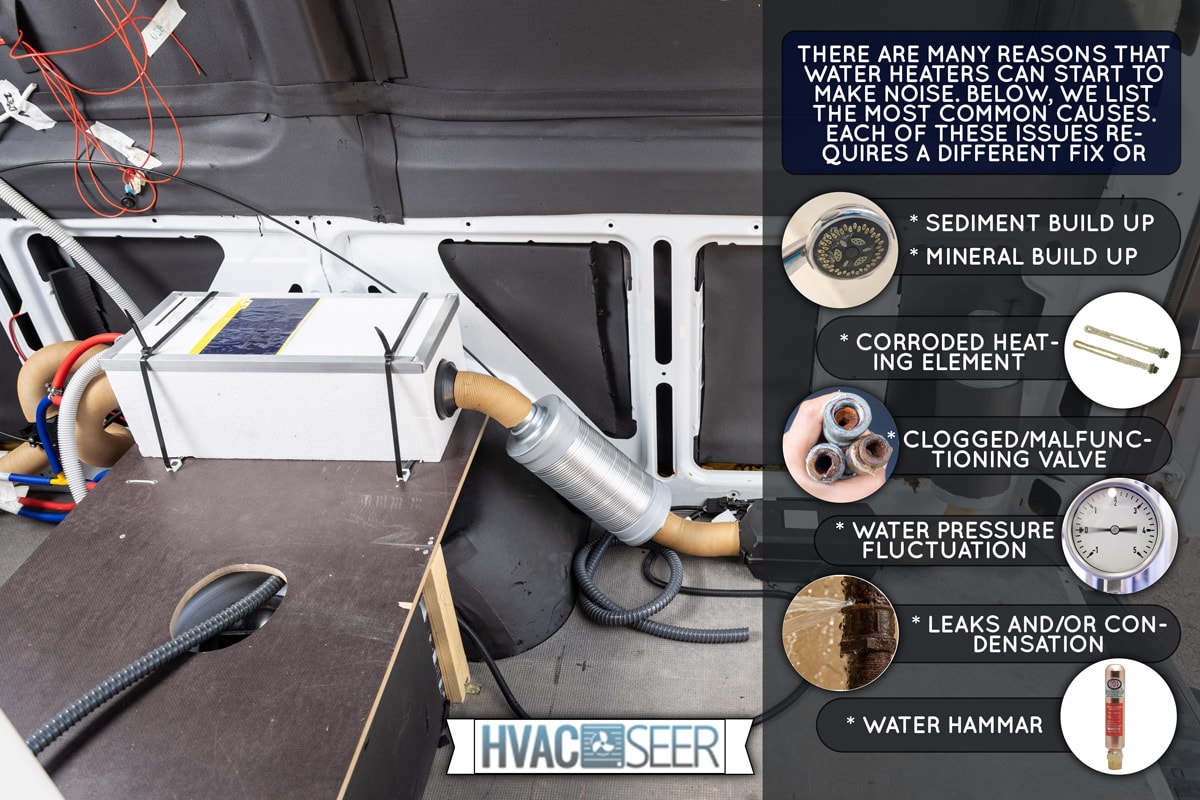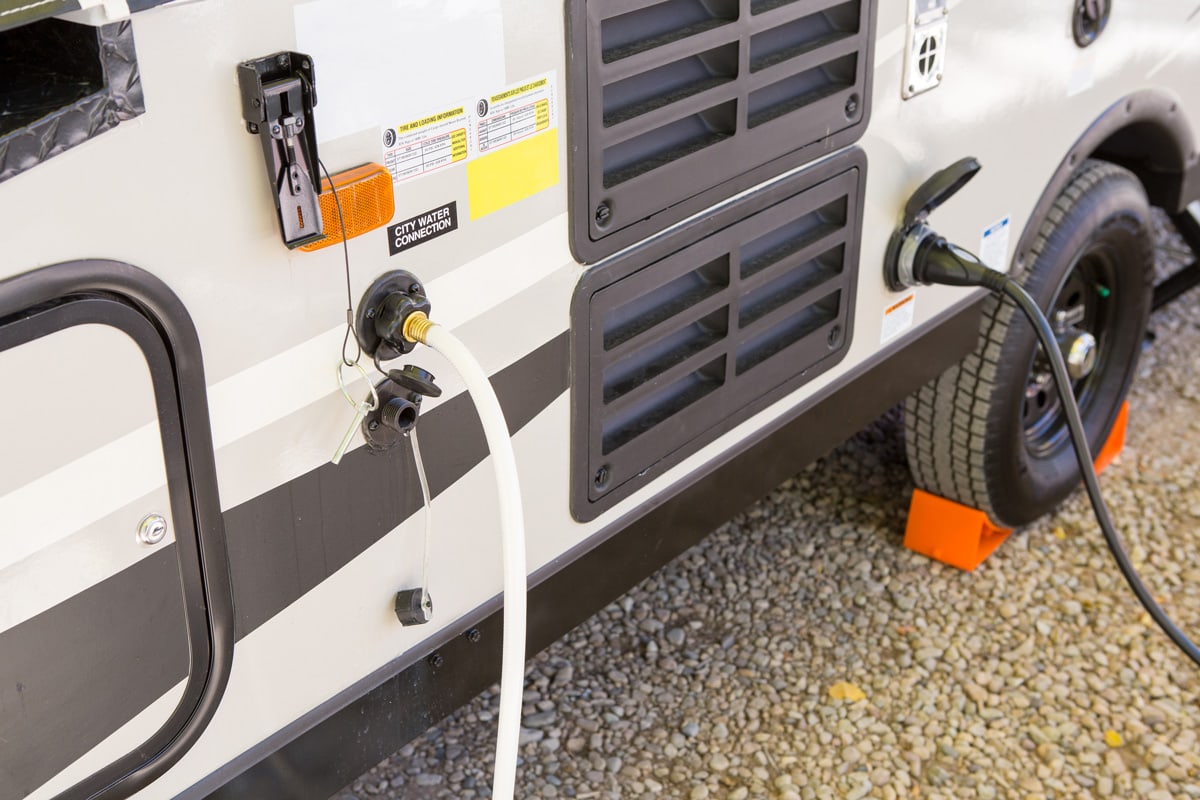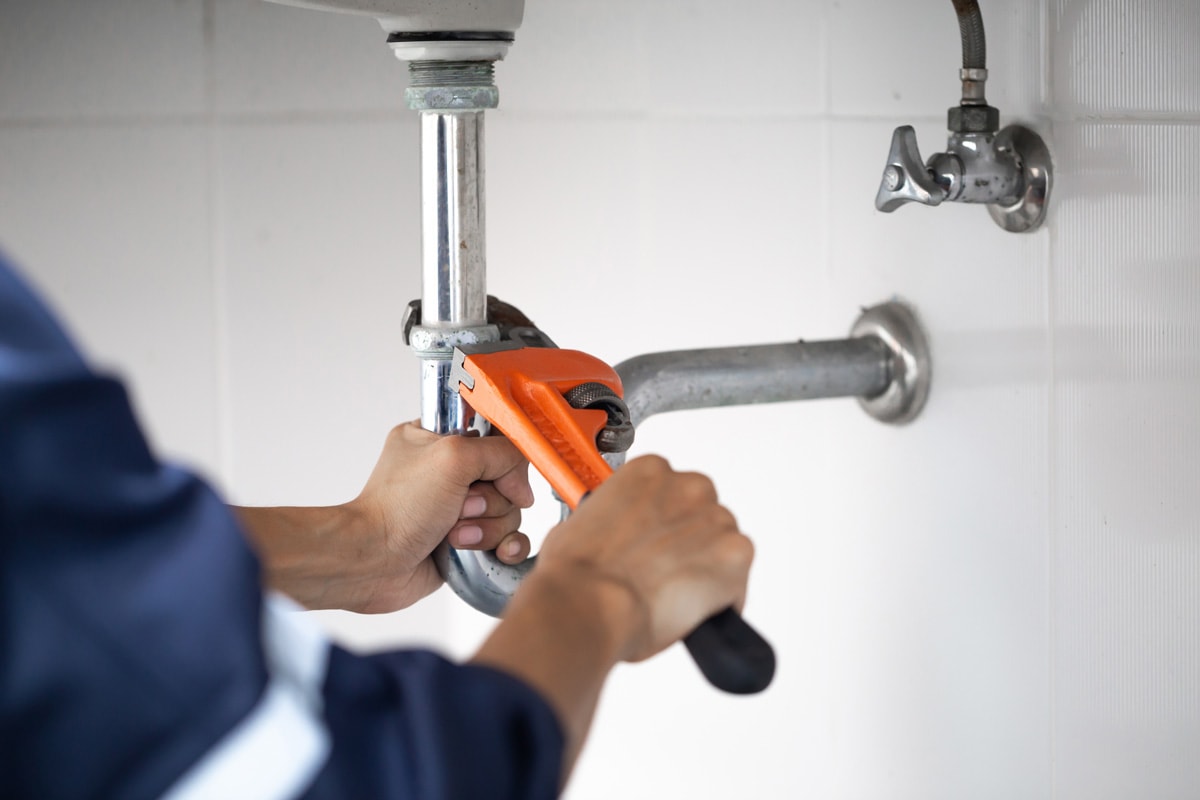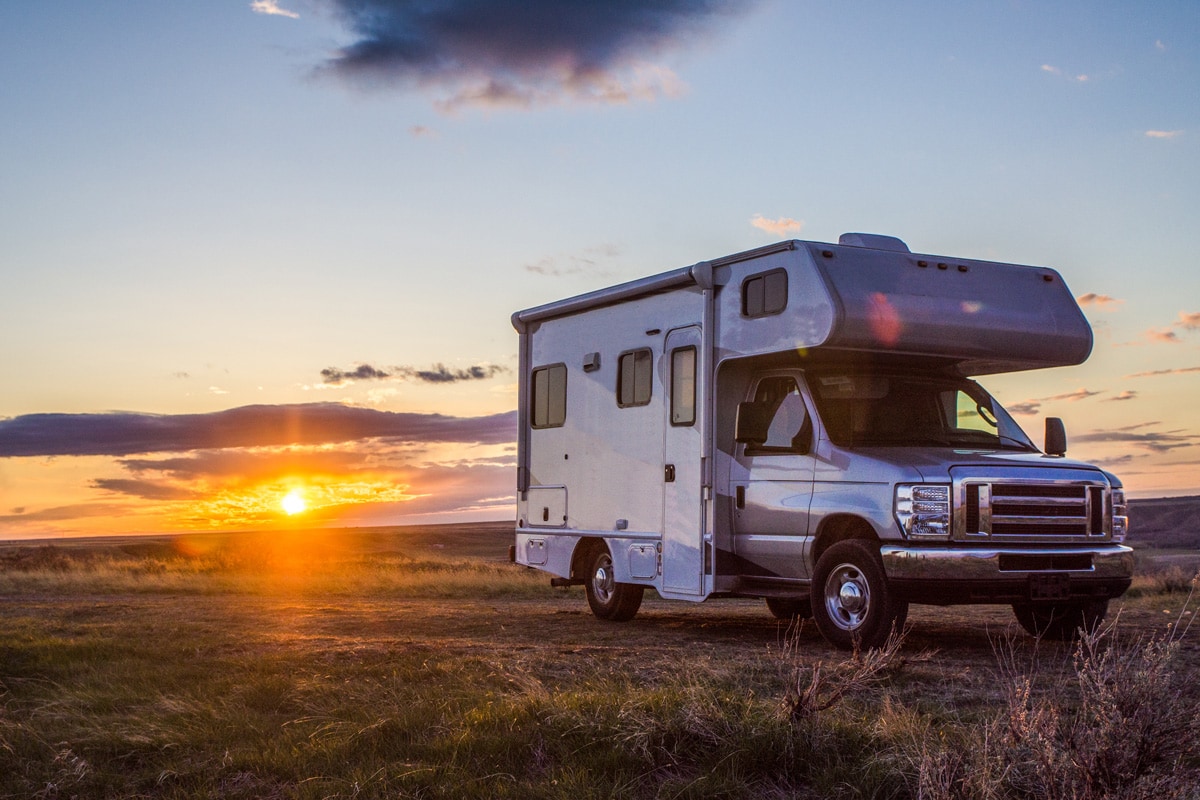Unusual or annoying noises can ruin the RV experience; noises from your water heater are no exception.
You have narrowed down the source of your noise to your water heater but are wondering why it is making noise and what to do about it.
In this post, we have scoured the internet to answer your question thoroughly.
There are many reasons that water heaters can start to make noise. Below, we've listed the most common causes. Each of these issues requires a different fix or problem-solving process:
- Sediment Build Up
- Mineral Build Up
- Corroded Heating Element
- Clogged/Malfunctioning Valve
- Water Pressure Fluctuation
- Leaks and Condensation
- Water Hammer
Keep reading the rest of this post for details on the above causes of water heater noise. Each section will include the type of sound you should expect from that particular problem and steps to make the noise disappear.
To conclude, we will answer a few related questions and offer a valuable additional reading list.

Sediment Build-Up
Water, no matter its source, has some sediment in it. Often, this is an even more significant problem for RVs because of water from hoses, campgrounds, and random out-of-the-way gas stations.
Generally, internal filter systems filter the sediment out. However, even the best filters allow some sediment in - which can lead to noisy water heaters.
Once sediment builds up enough on the bottom of the tank, it can trap steam bubbles, making a popping noise.
Also, the water may have difficulty traveling through sediment, which will cause more of a rumbling noise [like stones in the bottom of a fish tank].
Fixing Sediment Build-Up
Fixing sediment buildup is usually a matter of locating the drain plug, using an appropriately sized wrench, and opening the drain.
Take care that the tank will drain into an area not susceptible to water damage.
With sediment alone, it usually drains and fills the tank a few times to flush all the residue out. When done, be sure to retighten the drain plug fully.
Click here for an RV pre-filter from Amazon.
If you have this problem persistently, consider purchasing an additional in-line pre-filter to clean sediment out of your RV's water.
Mineral Build-Up
Mineral buildup is a common problem when suspended minerals naturally occurring in water 'fall out' and attach to the inside of your water heater tank and water-heater tank components.
This buildup can clog valves, coat the heating element, and cause other issues.
The noises associated with mineral buildup vary depending on the specific problem but are often associated with a high-pitched whine or singing noise.
Other times, mineral buildup, called scale, will cause a popping noise.
If you flush your tank and notice white calcium in the flushed water, the mineral buildup is likely the problem.
Fixing Mineral Build-up
You will want to use a flushing agent in the tank's water to fix mineral buildup. Generally, this involves filling the tank with a vinegar solution or other specific product sold at RV stores.
Allow this to sit in the tank for a while, and then drain the tank using the drain plug. This draining should include lots of white scaly buildup! Usually, this alone will fix the noise.
However, the issue is sometimes more dire and requires you to replace a specific part.
Click here for a mineral water filter from Amazon.
Once again, if this problem is persistent, consider adding a new or improved filter to your system.
Corroded Heating Element
Heating elements can become corrupted with mineral buildup. When this happens, the tank may create a high-pitched noise when running. You will want to replace the component and anode to fix this issue.
Fixing a Corroded Heating Element
Fixing a corroded heating element seems complicated but is a relatively straightforward process.
First, you will want to drain the tank of all water and sediment. If you fear mineral buildup is your issue—take the time to use a flushing solution.
Click here for a new 12V heating element from Amazon.
Now, locate and remove your heating element. Usually, these can be taken apart by an experienced DIYer. As you take apart and remove it, be sure to carefully note or take pictures of how all the parts go together.
A heavily corroded heating element should be relatively prominent and covered in the mineral buildup.
Usually, it is not worth cleaning and replacing the elements as they are relatively affordable. Therefore, match your heater model number to an internet search and buy a new heating element online.
Finally, reinstall the new element in the reverse order that you took the old one out!
Replace Anode Concurrently
While replacing the heating element, it is wise to replace the anode concurrently. The anode is designed to attract the materials that corrode the part and slow the corrosion process.
Therefore, if your heating element is corrupted, it almost always means your anode was already corroded to zero function.
Clogged/Malfunctioning Valve
The check and relief valves are commonly clogged and will make noises. Usually, this is caused by either sediment or minerals. It is common for the noise to sound like a sizzling.
How to Fix Clogged/Malfunctioning Valves
If flushing or draining your system does not fix the noise, visually inspect your check valve and relief valve. You can find these using your owner's manual or by researching your water heater model online.
If they look clean, then they are probably not the issue. However, if they are clogged, you can bet that you have found the source of your noise.
Click here for a relief valve from Amazon.
You can try cleaning the valves with vinegar, other water-softening solutions, and a soft-bristled brush. Alternatively, you can replace the valves with new ones.
Usually, replacing it is wise if you have gone through the trouble of locating and inspecting the valve and found it clogged.
Water Pressure Fluctuation

Water pressure fluctuations may cause a ticking noise that may sound. There are nipples on top of many heaters designed to increase energy efficiency.
If you listen closely to these parts, you can hear whether they are the source of the noise.
Other times, the noise of water pressure fluctuations may be elsewhere in your plumbing or near your water heater. In these cases, the sound will be of your pipes rubbing against other parts of your RV.
How to Fix Noise from Water Pressure Fluctuation
Click here for water tank nipples from Amazon.
If the source is the nipples on your water heater, try replacing them with non-energy-efficient varieties.
If your noise comes from a section of the piping itself, try affixing the piping in place with wires or other methods to deaden or stop the noise.
Leaks and Condensation
The sound of running or dripping water is the worst possible noise because this often indicates a leak. If this is the case, turn the water main off immediately! Now, look around your water heater and plumbing for the issue.
Sometimes, there may be no apparent leak. If you still hear a dripping noise, condensation may be the problem.
Condensation occurs when your water heater area heats up and cools off, and water 'falls out' of the air onto the walls and ceiling. Then, it drips.
How to Fix Leaks and Condensation
Most RVers choose to call a professional to deal with leaks. Whether in the water heater or the surrounding pipe, these problems can cause severe damage.
The damage can be exacerbated if the attempted fix is not done correctly.

However, the general technique is to shut off the water, remove or cut out the broken area/part, and glue in or replace the damaged part with a new position.
Be sure to use compatible piping and glue and follow all container directions.
Condensation is a relatively minor problem and can be fixed by adding dehumidifier products to your water heater space or by simply toweling up the small amount of water that condenses.
Water Hammer
If you hear a hammering or knocking noise, you may be dealing with a phenomenon known as the water hammer. This noise usually happens when you shut off the water.
Then, the water rushes back into the heater and makes a knocking noise. This can damage the heater and the surrounding pipes.
How to Fix the Water Hammer
You can install a hammer arrestor in your water heater system if you have a water hammer problem.
Generally, you will want to install this as close to the hammer noise location as possible.
Essentially, you need to insert the hammer arrestor into the piping by cutting the pipe and putting the arrestor in.
Click here for a 3/4-inch hammer arrestor from Amazon.
This involves purchasing the correct size arrestor and inserting/securing it so that the integrity of the water system remains intact. Sometimes, this is a job best left to the professionals.
Additional Reading
To learn more about RV life, read these excellent HVACSeer articles:
- How To Add Freon To Recharge A Coleman RV Air Conditioner
- Coleman Mach RV AC Fan Not Working: Why And What To Do?
- What Type Of Freon For A Coleman RV Air Conditioner?
In Closing

This post covered identifying and fixing the noise you hear from your RV water heater. All told we covered seven different causes and their related solutions. To close, we recommend some additional reading on RVs. Good luck!






